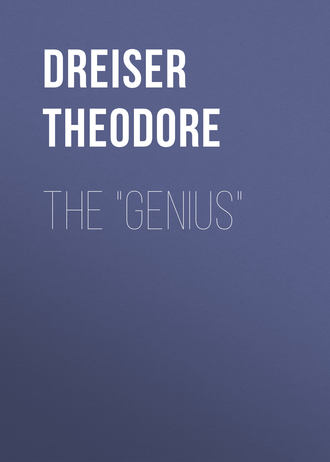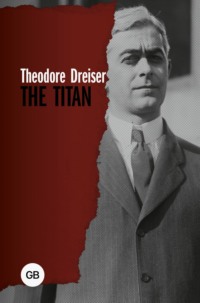 полная версия
полная версияThe "Genius"
He shook his head woefully. Suzanne looked at his weary face, her own as fresh as the morning.
"Oh, if I might only have had you to begin with!" he added.
"Listen, Eugene," said Suzanne. "You know I feel sorry for Mrs. Witla. We shouldn't have done what we did last night, but you made me. You know you will never listen to me, until it's too late. You're so headstrong! I don't want you to leave Mrs. Witla unless you want to. You needn't for me. I don't want to marry you; not now, anyhow. I'd rather just give myself to you, if you want me to. I want time though, to think and plan. If mama should hear today, there would be a terrible time. If we have time to think, we may bring her round. I don't care anything about what Mrs. Witla told you last night. I don't want you to leave her. If we could just arrange some way. It's mama, you know."
She swung his hand softly in hers, pressing his fingers. She was deep in thought, for her mother presented a real problem.
"You know," she went on, "mama isn't narrow. She doesn't believe much in marriage unless it's ideal. Mrs. Witla's condition wouldn't make so much difference if only the child were here. I've been thinking about that. Mama might sanction some arrangement if she thought it would make me happy and there was no scandal. But I'll have to have time to talk to her. It can't be done right away."
Eugene listened to this with considerable surprise, as he did to everything Suzanne volunteered. She seemed to have been thinking about these questions a long time. She was not free with her opinions. She hesitated and halted between words and in her cogitations, but when they were out this was what they came to. He wondered how sound they were.
"Suzanne," he said, "you take my breath away! How you think! Do you know what you're talking about? Do you know your mother at all well?"
"Mama? Oh, yes, I think I understand mama. You know she's very peculiar. Mama is literary and romantic. She talks a great deal about liberty, but I don't take in everything she says. I think mama is different from most women – she's exceptional. She likes me, not so much as a daughter as a person. She's anxious about me. You know, I think I'm stronger than mama. I think I could dominate her if I tried. She leans on me now a lot, and she can't make me do anything unless I want to. I can make her come to my way of thinking, I believe. I have, lots of times. That's what makes me think I might now, if I have time. It will take time to get her to do what I want."
"How much time?" asked Eugene thoughtfully.
"Oh, I don't know. Three months. Six months. I can't tell. I would like to try, though."
"And if you can't, then what?"
"Why, then – why, then I'll defy her, that's all. I'm not sure, you know. But I think I can."
"And if you can't?"
"But I can. I'm sure I can." She tossed her head gaily.
"And come to me?"
"And come to you."
They were near One Hundredth Street, under the trees. There was a lone man some distance away, walking from them. Eugene caught Suzanne in his arms and implanted a kiss upon her mouth. "Oh, you divinity!" he exclaimed. "Helen! Circe!"
"No," she replied, with smiling eyes. "No, not here. Wait till we get a car."
"Shall we go to Claremont?"
"I'm not hungry."
"Then we might as well call a car and ride."
They hunted a garage and sped northward, the wonderful wind of the morning cooling and refreshing their fevered senses. Both he and Suzanne were naturally depressed at moments, at other moments preternaturally gay, for he was varying between joy and fear, and she was buoying him up. Her attitude was calmer, surer, braver, than his. She was like a strong mother to him.
"You know," he said, "I don't know what to think at times. I haven't any particular charge against Mrs. Witla except that I don't love her. I have been so unhappy. What do you think of cases of this kind, Suzanne? You heard what she said about me."
"Yes, I heard."
"It all comes from that. I don't love her. I never have really from the beginning. What do you think where there is no love? It is true, part of what she said. I have been in love with other women, but it has always been because I have been longing for some sort of temperament that was congenial to me. I have, Suzanne, too, since I have been married. I can't say that I was really in love with Carlotta Wilson, but I did like her. She was very much like myself. The other was a girl somewhat like you. Not so wise. That was years ago. Oh, I could tell you why! I love youth. I love beauty. I want someone who is my companion mentally. You are that, Suzanne, and yet see what a hell it is creating. Do you think it is so bad where I am so very unhappy? Tell me, what do you think?"
"Why, why," said Suzanne, "I don't think anyone ought to stick by a bad bargain, Eugene."
"Just what do you mean by that, Suzanne?"
"Well, you say you don't love her. You're not happy with her. I shouldn't think it would be good for her or you to have you stay with her. She can live. I wouldn't want you to stay with me if you didn't love me. I wouldn't want you at all if you didn't. I wouldn't want to stay with you if I didn't love you, and I wouldn't. I think marriage ought to be a happy bargain, and if it isn't you oughtn't to try to stay together just because you thought you could stay together once."
"What if there were children?"
"Well, that might be different. Even then, one or the other could take them, wouldn't you think? The children needn't be made very unhappy in such a case."
Eugene looked at Suzanne's lovely face. It seemed so strange to hear her reasoning so solemnly – this girl!
"But you heard what she said about me, Suzanne, and about her condition?"
"I know," she said. "I've thought about it. I don't see that it makes so very much difference. You can take care of her."
"You love me just as much?"
"Yes."
"Even if all she says is true?"
"Yes."
"Why, Suzanne?"
"Well, all her charges concerned years gone by, and that isn't now. And I know you love me now. I don't care about the past. You know, Eugene, I don't care anything about the future, either. I want you to love me only so long as you want to love me. When you are tired of me, I want you to leave me. I wouldn't want you to live with me if you didn't love me. I wouldn't want to live with you if I didn't love you."
Eugene looked into her face, astonished, pleased, invigorated, and heartened by this philosophy. It was so like Suzanne, he thought. She seemed to have reached definite and effective conclusions so early. Her young mind seemed a solvent for all life's difficulties.
"Oh, you wonderful girl!" he said. "You know you are wiser than I am, stronger. I draw to you, Suzanne, like a cold man to a fire. You are so kindly, so temperate, so understanding!"
They rode on toward Tarrytown and Scarborough, and on the way Eugene told Suzanne some of his plans. He was willing not to leave Angela, if that was agreeable to her. He was willing to maintain this outward show, if that was satisfactory. The only point was, could he stay and have her, too? He did not understand quite how she could want to share him with anybody, but he could not fathom her from any point of view, and he was fascinated. She seemed the dearest, the subtlest, the strangest and most lovable girl. He tried to find out by what process she proposed to overcome the objections of her mother, but Suzanne seemed to have no plans save that of her ability to gradually get the upper hand mentally and dominate her. "You know," she said at one point, "I have money coming to me. Papa set aside two hundred thousand dollars for each of us children when we should come of age, and I am of age now. It is to be held in trust, but I shall have twelve thousand or maybe more from that. We can use that. I am of age now, and I have never said anything about it. Mama has managed all these things."
Here was another thought which heartened Eugene. With Suzanne he would have this additional income, which might be used whatever else might betide. If only Angela could be made to accept his conditions and Suzanne could win in her contest with her mother all would be well. His position need not be jeopardized. Mrs. Dale need hear nothing of it at present. He and Suzanne could go on associating in this way until an understanding had been reached. It was all like a delightful courtship which was to bloom into a still more delightful marriage.
The day passed in assurances of affection. Suzanne told Eugene of a book she had read in French, "The Blue Bird." The allegory touched Eugene to the quick – its quest for happiness, and he named Suzanne then and there "The Blue Bird." She made him stop the car and go back to get her an exquisite lavender-hued blossom growing wild on a tall stalk which she saw in a field as they sped by. Eugene objected genially, because it was beyond a wire fence and set among thorns, but she said, "Yes, now, you must. You know you must obey me now. I am going to begin to train you now. You've been spoiled. You're a bad boy. Mama says that. I am going to reform you."
"A sweet time you'll have, Flower Face! I'm a bad lot. Have you noticed that?"
"A little."
"And you still like me?"
"I don't mind. I think I can change you by loving you."
Eugene went gladly. He plucked the magnificent bloom and handed it to her "as a sceptre," he said. "It looks like you, you know," he added. "It's regal."
Suzanne accepted the compliment without thought of its flattering import. She loved Eugene, and words had scarcely any meaning to her. She was as happy as a child and as wise in many things as a woman twice her years. She was as foolish as Eugene over the beauty of nature, dwelling in an ecstasy upon morning and evening skies, the feel of winds and the sigh of leaves. The beauties of nature at every turn caught her eye, and she spoke to him of things she felt in such a simple way that he was entranced.
Once when they had left the car and were walking about the grounds of an inn, she found that one of her silk stockings had worn through at the heel. She lifted up her foot and looked at it meditatively. "Now, if I had some ink I could fix that up so quickly," she said, laughing.
"What would you do?" he asked.
"I would black it," she replied, referring to her pink heel, "or you could paint it."
He laughed and she giggled. It was these little, idle simplicities which amused and fascinated him.
"Suzanne," he said dramatically at this time, "you are taking me back into fairyland."
"I want to make you happy," she said, "as happy as I am."
"If I could be! If I only could be!"
"Wait," she said; "be cheerful. Don't worry. Everything will come out all right. I know it will. Things always come right for me. I want you and you will come to me. You will have me just as I will have you. Oh, it is all so beautiful!"
She squeezed his hand in an ecstasy of delight and then gave him her lips.
"What if someone should see?" he asked.
"I don't care! I don't care!" she cried. "I love you!"
CHAPTER XII
After dining joyously, these two returned to the city. Suzanne, as she neared New York proper, was nervous as to what Angela might have done, for she wanted, in case Angela told her mother, to be present, in order to defend herself. She had reached a rather logical conclusion for her, and that was, in case her mother objected too vigorously, to elope with Eugene. She wanted to see just how her mother would take the intelligence in order that she might see clearly what to do. Previously she had the feeling that she could persuade her mother not to interfere, even in the face of all that had been revealed. Nevertheless, she was nervous, and her fears were bred to a certain extent by Eugene's attitude.
In spite of all his bravado, he really did not feel at all secure. He was not afraid of what he might lose materially so much as he was of losing Suzanne. The thought of the coming child had not affected them at all as yet. He could see clearly that conditions might come about whereby he could not have her, but they were not in evidence as yet. Besides, Angela might be lying. Still at odd moments his conscience troubled him, for in the midst of his intense satisfaction, his keenest thrills of joy, he could see Angela lying in bed, the thought of her wretched future before her, the thought of the coming life troubling her, or he could hear the echo of some of the pleas she had made. It was useless to attempt to shut them out. This was a terrible ordeal he was undergoing, a ruthless thing he was doing. All the laws of life and public sentiment were against him. If the world knew, it would accuse him bitterly. He could not forget that. He despaired at moments of ever being able to solve the tangle in which he had involved himself, and yet he was determined to go on. He proposed accompanying Suzanne to her friends, the Almerdings, but she changed her mind and decided to go home. "I want to see whether mama has heard anything," she insisted.
Eugene had to escort her to Staten Island and then order the chauffeur to put on speed so as to reach Riverside by four. He was somewhat remorseful, but he argued that his love-life was so long over, in so far as Angela was concerned, that it could not really make so very much difference. Since Suzanne wanted to wait a little time and proceed slowly, it was not going to be as bad for Angela as he had anticipated. He was going to give her a choice of going her way and leaving him entirely, either now, or after the child was born, giving her the half of his property, stocks, ready money, and anything else that might be divisible, and all the furniture, or staying and tacitly ignoring the whole thing. She would know what he was going to do, to maintain a separate ménage, or secret rendezvous for Suzanne. He proposed since Suzanne was so generous not to debate this point, but to insist. He must have her, and Angela must yield, choosing only her conditions.
When he came to the house, a great change had come over Angela. In the morning when he left she was hard and bitter in her mood. This afternoon she was, albeit extremely sad, more soft and melting than he had ever seen her. Her hard spirit was temporarily broken, but in addition she had tried to resign herself to the inevitable and to look upon it as the will of God. Perhaps she had been, as Eugene had often accused her of being, hard and cold. Perhaps she had held him in too tight leading strings. She had meant it for the best. She had tried to pray for light and guidance, and after a while something softly sad, like a benediction, settled upon her. She must not fight any more, she thought. She must yield. God would guide her. Her smile, kindly and wan, when Eugene entered the room, took him unawares.
Her explanation of her mood, her prayers, her willingness to give him up if need be, even in the face of what was coming to her, moved him more than anything that had ever passed between them. He sat opposite her at dinner, looking at her thin hands and face, and her sad eyes, trying to be cheerful and considerate, and then, going back into her room and hearing her say she would do whatever he deemed best, burst into tears. He cried from an excess of involuntary and uncontrolled emotion. He hardly knew why he cried, but the sadness of everything – life, the tangle of human emotions, the proximity of death to all, old age, Suzanne, Angela, all – touched him, and he shook as though he would rend his sides. Angela, in turn, was astonished and grieved for him. She could scarcely believe her eyes. Was he repenting? "Come to me, Eugene!" she pleaded. "Oh, I'm so sorry! Are you as much in love as that? Oh, dear, dear, if I could only do something! Don't cry like that, Eugene. If it means so much to you, I will give you up. It tears my heart to hear you. Oh, dear, please don't cry."
He laid his head on his knees and shook, then seeing her getting up, came over to the bed to prevent her.
"No, no," he said, "it will pass. I can't help it. I'm sorry for you. I'm sorry for myself. I'm sorry for life. God will punish me for this. I can't help it, but you are a good woman."
He laid his head down beside her and sobbed, great, aching sobs. After a time he recovered himself, only to find that he had given Angela courage anew. She would think now that his love might be recovered since he had seemed so sympathetic; that Suzanne might be displaced. He knew that could not be, and so he was sorry that he had cried.
They went on from that to discussion, to argument, to ill-feeling, to sympathetic agreement again by degrees, only to fall out anew. Angela could not resign herself to the thought of giving him up. Eugene could not see that he was called upon to do anything, save divide their joint possessions. He was most anxious to have nothing to do with Angela anymore in any way. He might live in the same house, but that would be all. He was going to have Suzanne. He was going to live for her only. He threatened Angela with dire consequences if she tried to interfere in any way. If she communicated with Mrs. Dale, or said anything to Suzanne, or attempted to injure him commercially, he would leave her.
"Here is the situation," he would insist. "You can maintain it as I say, or break it. If you break it, you lose me and everything that I represent. If you maintain it, I will stay here. I think I will. I am perfectly willing to keep up appearances, but I want my freedom."
Angela thought and thought of this. She thought once of sending for Mrs. Dale and communicating with her secretly, urging her to get Suzanne out of the way without forewarning either the girl or Eugene, but she did not do this. It was the one thing she should have done and a thing Mrs. Dale would have agreed to, but fear and confusion deterred her. The next thing was to write or talk to Suzanne, and because she mistrusted her mood in Suzanne's presence she decided to write. She lay in bed on Monday when Eugene was away at the office and composed a long letter in which she practically gave the history of Eugene's life reiterating her own condition and stating what she thought Eugene ought to do.
"How can you think, Suzanne," she asked in one place, "that he will be true to you when he can ignore me, in this condition? He has not been true to anyone else. Are you going to throw your life away? Your station is assured now. What can he add to you that you have not already? If you take him, it is sure to become known. You are the one who will be injured, not he. Men recover from these things, particularly from an infatuation of this character, and the world thinks nothing of it; but the world will not forgive you. You will be 'a bad woman' after this, irretrievably so if a child is born. You think you love him. Do you really love him this much? Read this and stop and think. Think of his character. I am used to him. I made my mistakes in the beginning, and it is too late for me to change. The world can give me nothing. I may have sorrow and disgust, but at least I shall not be an outcast and our friends and the world will not be scandalized. But you – you have everything before you. Some man will come to you whom you will love and who will not ask and willingly make a sacrifice of you. Oh, I beg you to think! You do not need him. After all, sorry as I am to confess it, I do. It is as I tell you. Can you really afford to ignore this appeal?"
Suzanne read this and was greatly shocked. Angela painted him in a wretched light, as fickle, deceitful, dishonest in his relations with women. She debated this matter in her own room, for it could not help but give her pause. After a time, Eugene's face came back to her, however, his beautiful mind, the atmosphere of delight and perfection that seemed to envelop all that surrounded him. It was as though Eugene were a mirage of beauty, so soft, so sweet, so delightful! Oh, to be with him; to hear his beautiful voice; to feel his intense caresses! What could life offer her equal to that? And, besides, he needed her. She decided to talk it out with him, show him the letter, and then decide.
Eugene came in a day or two, having phoned Monday and Tuesday mornings. He made a rendezvous of the ice house, and then appeared as eager and smiling as ever. Since returning to the office and seeing no immediate sign of a destructive attitude on Angela's part, he had recovered his courage. He was hopeful of a perfect dénouement to all this – of a studio and his lovely Suzanne. When they were seated in the auto, she immediately produced Angela's letter and handed it to him without comment. Eugene read it quietly.
He was greatly shocked at what he read, for he thought that Angela was more kindly disposed toward him. Still he knew it to be true, all of it, though he was not sure that Suzanne would suffer from his attentions. The fates might be kind. They might be happy together. Anyhow, he wanted her now.
"Well," he said, giving it back, "what of it? Do you believe all she says?"
"It may be so, but somehow when I am with you I don't seem to care. When I am away from you, it's different. I'm not so sure."
"You can't tell whether I am as good as you think I am?"
"I don't know what to think. I suppose all she says about you is true. I'm not sure. When you're away, it's different. When you are here, I feel as though everything must come out right. I love you so. Oh, I know it will!" She threw her arms around him.
"Then the letter doesn't really make any difference?"
"No."
She looked at him with big round eyes, and it was the old story, bliss in affection without thought. They rode miles, stopped at an inn for something to eat – Mrs. Dale was away for the day – looked at the sea where the return road skirted it, and kissed and kissed each other. Suzanne grew so ecstatic that she could see exactly how it was all coming out.
"Now you leave it to me," she said. "I will sound mama. If she is at all logical, I think I can convince her. I would so much rather do it that way. I hate deception. I would rather just tell her, and then, if I have to, defy her. I don't think I shall have to, though. She can't do anything."
"I don't know about that," said Eugene cautiously. He had come to have great respect for Suzanne's courage, and he was rather relying on Mrs. Dale's regard for him to stay her from any desperate course, but he did not see how their end was to be achieved.
He was for entering on an illicit relationship after a time without saying anything at all. He was in no hurry, for his feeling for Suzanne was not purely physical, though he wanted her. Because of her strange reading and philosophy, she was defying the world. She insisted that she did not see how it would hurt her.
"But, my dear, you don't know life," said Eugene. "It will hurt you. It will grind you to pieces in all places outside of New York. This is the Metropolis. It is a world city. Things are not quite the same here, but you will have to pretend, anyhow. It is so much easier."
"Can you protect me?" she asked significantly, referring to the condition Angela pleaded. "I wouldn't want – I couldn't, you know, not yet, not yet."
"I understand," he said. "Yes, I can, absolutely."
"Well, I want to think about it," she said again. "I prefer so much to be honest about it. I would so much rather just tell mama, and then go and do it. It would be so much nicer. My life is my own to do with as I please. It doesn't concern anybody, not even mama. You know, if I want to waste it, I may, only I don't think that I am doing so. I want to live as I choose. I don't want to get married yet."
Eugene listened to her with the feeling that this was the most curious experience of his life. He had never heard, never seen, never experienced anything like it. The case of Christina Channing was different. She had her art to consider. Suzanne had nothing of the sort. She had a lovely home, a social future, money, the chance of a happy, stable, normal life. This was love surely, and yet he was quite at sea. Still so many favorable things had happened, consciously favorable, that he was ready to believe that all this was intended for his benefit by a kind, governing providence.
Angela had practically given in already. Why not Suzanne's mother? Angela would not tell her anything. Mrs. Dale was not any stronger than Angela apparently. Suzanne might be able to control her as she said. If she was so determined to try, could he really stop her? She was headstrong in a way and wilful, but developing rapidly and reasoning tremendously. Perhaps she could do this thing. Who could tell? They came flying back along lovely lanes where the trees almost swept their faces, past green stretches of marsh where the wind stirred in ripples the tall green cat grass, past pretty farm yards, with children and ducks in the foreground, beautiful mansions, playing children, sauntering laborers. All the while they were reassuring each other, vowing perfect affection, holding each other close. Suzanne, as Angela had, loved to take Eugene's face between her hands and look into his eyes.









